Lesson 13 篇章的翻译:文学文本的翻译
现代大学英语精读3第13课翻译

第十三课军人病1.登陆战于1944年6月在法国展开。
士兵们面朝下趴下,空气中弥漫着各种声音,空中传来刺耳的呼啸声并且随着震耳欲聋的爆炸声而终止。
这可能只是瞬间发生的事情。
倘若声音还在持续不断,你就会看到士兵们用战锹刮去地表土,把自己隐藏在挖出的地洞里,像动物一样从眼前消逝。
2.要么就是士兵们成两路纵队沿着公路。
卧倒在地上。
他们要么分散开,在一大片开阔地上前进。
一道路堤从穿过棗这是一条铁路。
这时传来了一阵短促的刺耳声响,紧接着就是一阵有节奏的轰隆声。
如果你恰好与这些人在一起,听起来就像天空给撕成了碎片。
一个人倒下去,其他人继续往前冲去,时而蜷伏在路基后面作为掩护。
3.这就是1944年夏天一个步兵在法国经历的生或死的考验。
这些动作会不断重复多次……景物会发生变化。
从一排排栽成树篱的灌木分隔开的块块农田,遍布风车的辽阔平原,到白雪皑皑的森林地带。
士兵们穿过座座村落,此时又来到了河岸,乘坐橡皮船渡河。
他们最终又行进在崇山峻岭之中。
4.1945年,我从美国陆军复员,重返大学读书。
我还模糊地记得,我和其他学生一起坐在一间教室里棗只有几个学生围坐在一张长方形桌子旁边,正在讨论这一大本书。
这门课是高年级学生上的,被称作学术报告会。
我在如饥似渴地阅读着各种书籍。
我不读书时便写小说、散文、诗歌……5.接下来我就什么也不知道了。
有个人说,我丢失了和别人公用的公寓房门钥匙,被人发现时已昏倒在门外。
一个朋友在信中告诉我,我一直在大街上徘徊,被警察带走,我还激烈地反抗过。
6.我住进了一间医院的病房。
这不是一家军队医院,而是长岛上的金斯公园。
我认为,这是因为战后退伍军人医院爆满,剩下的人员只好住进别的地方。
7.我的病是在枪林弹雨中连续战斗几个月的结果,现在起了个什么名称?我想,在海湾战争中我们的许多士兵不会得上这种病棗他们没有长期与敌人交火。
越南战争结束后,这种病被称作“精神创伤后遗症”。
在第二次世界大战期间被称为“战斗疲劳症”。
Lesson13课文原文翻译及重点冀教版七年级英语下册
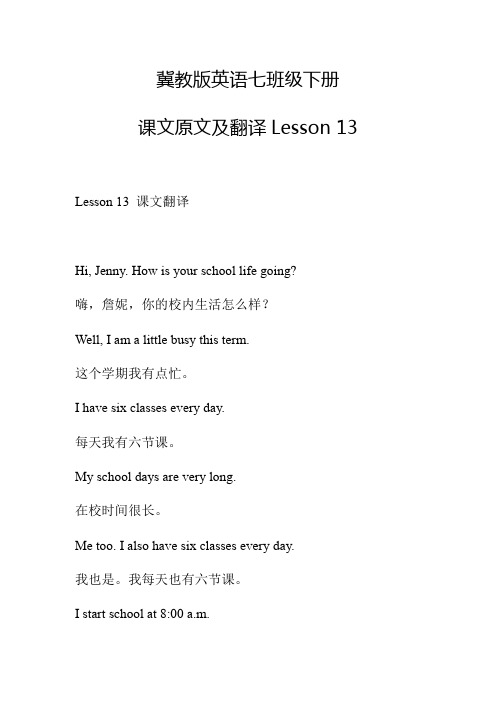
冀教版英语七班级下册课文原文及翻译Lesson 13 Lesson 13 课文翻译Hi, Jenny. How is your school life going?嗨,詹妮,你的校内生活怎么样?Well, I am a little busy this term.这个学期我有点忙。
I have six classes every day.每天我有六节课。
My school days are very long.在校时间很长。
Me too. I also have six classes every day.我也是。
我每天也有六节课。
I start school at 8:00 a.m.我早上八点钟上课。
I usually finish at 5:00 p.m.通常下午五点放学It's a long day, but I like my school.漫长的一天,但是我喜爱我的学校。
My school subjects are so interesting.我们的学科都很好玩。
What subjects do you have?你学哪些课程?I have Chinese, English, math, history and some others.我学习语文,英语,数学,历史和其他科目。
P.E. is my favourite.我最喜爱体育课。
We always have a big sports meet twice a year.我们通常每两年进行一次大型运动会。
I often take part in the long jump.我常常参与跳远活动。
Last term I won first place!上学期我得了第一名!Wow! You're good at the long jump.哇!我擅长跳远。
Yeah! Thank you!是的,感谢!What subjects do you have?你学哪些课程?I have social studies, shop, math, French, English and art.我有社会讨论课,手工艺课,数学课,法语课,英语课和美术课。
新概念第一册课文翻译及学习笔记【Lesson13、15、17】

【导语】新概念英语作为⼀套世界闻名的英语教程,以其全新的教学理念,有趣的课⽂内容和全⾯的技能训练,深受⼴⼤英语学习者的欢迎和喜爱。
为了⽅便同学们的学习,为⼤家整理了⾯的新概念第⼀册课⽂翻译及学习笔记,希望为⼤家的新概念英语学习提供帮助!Lesson13 【课⽂】 LOUISE: What colour's your new dress? ANNA: It's green. ANNA: Come upstairs and see it. LOUISE: Thank you. ANNA: Look! Here it is! LOUISE: That's a nice dress. It's very smart. ANNA: My hat's new, too. LOUISE: What colour is it? ANNA: It's the same colour. It's green, too. LOUISE: That is a lovely hat! 【课⽂翻译】 路易丝:你的新⾐裙是什么颜⾊的? 安娜:是绿⾊的。
安娜:到楼上来看看吧。
路易丝:谢谢。
安娜:瞧,就是这件。
路易丝:这件连⾐裙真好,真漂亮。
安娜:我的帽⼦也是新的。
路易丝:是什么颜⾊的? 安娜:⼀样的颜⾊,也是绿的。
路易丝:真是⼀顶可爱的帽⼦! 【⽣词】 colour n. 颜⾊ green adj. 绿⾊ come v. 来 upstairs adv. 楼上 smart adj. 时髦的,巧妙的 hat n. 帽⼦ same adj. 相同的 lovely adj. 可爱的,秀丽的 【知识点讲解】 1. 在上⼀课,我们已经为⼤家补充了很多种颜⾊的说法,今天这⼀课以及其后的练习课14课中,我们还将学到⼀些新的颜⾊:⽐如grey,灰⾊的;brown,棕⾊的,等等。
综合教程1 unit 13 课文翻译

Unit 13 The Light of DepressionSection One Pre-reading Activities (2)I. Reading aloud (2)II. Cultural information (2)III. Audiovisual supplements (3)Section Two Global Reading (4)I. Main idea (4)II. Structural analysis (4)Section Three Detailed Reading (5)Text I (5)Section Four Consolidation Activities (16)I. Vocabulary Analysis (16)II. Grammar Exercises (20)III. Translation exercises (23)IV. Exercises for integrated skills (24)V. Oral activities (25)VI. Writing Practice (26)VII. Listening Exercises (28)Section Five Further Enhancement (30)I. Text II (30)II. Memorable Quotes (33)Section One Pre-reading ActivitiesI. Reading aloudRead the following sentences aloud, paying special attention to intonation. The symbol | indicates a division of tone units, while ↗ and ↘ nuclear tones.1. When we arrived at the ↗hospital, | my dad walked around to her side of the ↗car, | gathered her into his arms ↗and ↘held her.2. At a ↗time in my ↗life | when the world was supposed to be opening up to ↗me, | I ↗found myself re ↘treating.3. They regarded it as a ↘bad case | of the ↘Sunday evening blues, | believing that if I ↗tried harder | and ↘stopped feeling sorry for my ↗self, | I would ―get ↘better.‖4. And ↗slowly, | the desire to ↘live, | the ↘courage to want to live, | began to re ↘turn.II. Cultural information1. QuoteW. M. Thackeray: Dare and the world always yields. If it beats you sometimes, dare it again and again and it will succumb.2. DepressionSome people say that depression feels like a black curtain of despair coming down over their lives. Many people feel like they have no energy and can't concentrate. Others feel irritable all the time for no apparent reason.Most people who have gone through one episode of depression will, sooner or later, have another one. The symptoms vary from person to person, but if you feel "down" for more than two weeks, and these feelings are interfering with your daily life, you may be clinically depressed.The common symptoms including:*poor concentration and memory*withdrawal from social situations and activities*an inability to experience pleasure in activities that were formerly enjoyed*preoccupied with thoughts and feelings of worthlessness, helplessness, self-hatred, etc.*thoughts of death or suicide, etc.Learning to recognize these early triggers or symptoms and working with your doctor will help to keep the depression from worsening. There are many forms of treatment that can help you cope with depression, including medications, psychotherapy or counseling.III. Audiovisual supplementsWatch a video clip and answer the following question.What impressed you in the video?Answer to the Question:We can see that the father and son have to stay in the toilet for the night, which means they were experiencing a hard time in life. But at the beginning, they were playing games on the subway platform. Actually, the father in the video was facing the difficulties with a positive attitude to life.Video Script:Chris: Look around! Look at all these dinosaurs!Christopher: Wow~!Chris: Can you see them?Christopher: Yeah!Chris: Wait! Come on! Come on! Wait! Watch out!Christopher: What is it?Chris:Don’t step in the fire! We’re cavemen. We need this fire, because there’s no electricity and it’s cold out here, Ok?Christopher: Watch out! Watch out!Chris: Whoa! Oh, my goodness … A.T. rex! Get your stuff! Get your stuff! Get it! We gotta find someplace safe.Christopher: Like what?Chris: Em … We need a cave.Christopher: A cave?Chris: We gotta find a cave. Come on.Christopher: Ok.Chris: Come on. Come on. Watch your back! Look out! Here it is! H ere’s a cave. Come on! Right here! Right here! Go, go, go! Go ahead. Get in! Hurry, hurry, hurry!Christopher: Are we safe?Chris: Yeah, I think so.Section Two Global ReadingI. Main ideaWhat is the story narrated in the text about?This narrative essay narrates and describes an unusual and unforgettable phase of the writer’s life, during which she experienced deep depression, voluntarily received clinical treatment, conquered the illness in the end, and benefited a great deal from the experiences associated with her suffering.II. Structural analysis1. How are the events of the essay arranged?The narration mostly follows a chronological order, but a few flashbacks are inserted in Paragraph 3 and 6.2. Work out the structure of the text by completing the table.Paragraph(s) Main idea1-3 It provides the background of the story, telling us about the writer and her family and her problem.4-10 The writer related her experiences with deep depression, including her attitude and reactions to it, focusing on her positive attitude and how she got better andfinally recovered.11 It describes the writer’s mood and feeling on a moon-lit, starry night, andstresses that her deep depression had been worth it, for suffering had paintedcolor into her life, and that she was thankful.Section Three Detailed ReadingText IThe Light of DepressionAlice Johnson1.Twice, I have seen my father cry. The first time, I was 12, and my sister, Jenny, was Shewas diagnosed with juvenile diabetes and needed further testing. When we arrived at the hospital, my dad walked around to her side of the car, gathered her into his arms and held her.None of us understood what was happening to my sister’s body, but when I heard my strong dad’s voice break with tears, I knew we were on a new and unexpected path.2.Almost 10 years later, in the fall following my college graduation, I was the one myfather gathered into his arms. At 22, I was diagnosed with clinical depression and voluntarily admitted to a psychiatric hospital. At a time in my life when the world was supposed to be opening up to me, I found myself retreating. Apathetic, uncaring, tired, and with no particular vision for any future, I drifted into a world without hope. My family and I knew I needed help.3.As a child, I had great passion for life. The simplest of pleasures brought unexplainablejoy. I seldom demonstrated a melancholic personality. In fact, my parents learned that birthdays, Christmas and any reason for celebration would find me in excitement. I loved life, and I loved being alive. When depression struck, I was dropped into a world where wearing my own skin was foreign and ill-fitting.4.My mom says that one of the hardest days of her life was the day I checked into thehospital. My personal belongings were rummaged through, and I headed down the long hallway to doctors and a treatment team that became my ―family‖ for the next month. Her drive home, leaving me behind, was heartbreaking. She was left to wonder and guess at why her daughter was in so much pain and why she couldn’t fix it this time.5.I was numb, trying to see through a haze that had settled upon what once was vivid andbright. All color had seeped from a life that used to hold such joy. Some peopl e didn’t understand my depression. They regarded it as a bad case of the Sunday evening blues believing that if I tried harder and stopped feeling sorry for myself, I would ―get better.‖ But I wasn’t just dealing with apathy toward routine.I couldn’t remedy being sick with a strenuous run, a good movie, or simply the passing of time. Depression transcended my circumstances and invaded my soul. It was more like a day terror —like waking up to a nightmare. Clinical depression painted my world black while screaming quietly that I was worthless.6.I remember driving home from work the week before I checked into the hospital. Myco-workers hadn’t noticed any difference in my performance or behavior. I was great at keeping up appearances. I was good at performing. But that evening, I recall wishing I weren’t alive, wishing my car would turn down an empty road and I could disappear. Upon arriving home, I headed straight for my room and slipped under my covers, hoping to sleep. I wanted to escape life because it hurt to breathe.7.By the end of my first week at the hospital, I had made up my mind to leave. It wasn’tworking. I packed my bags, headed to the front desk, and announced that I was calling my parents to come and pick me up. But my treatment team told me I needed to stay. Defeated and scared, I returned to my room, unpacked my bags and cried myself to sleep. It was time to get honest with myself.8.I was angry. Me, happy Alice, with so much going for her. Stripped of the world’saccolades, it didn’t m atter what school I had attended, where I had vacationed, what awards I had won. It didn’t matter who I knew, didn’t know, or thought I knew. What mattered to those surrounding me was that I was honest about my feelings. They didn’t have to be pretty. I di dn’t have to look good. I could just be — and that was enough.9.It was the kindness, sympathy, love and truth demonstrated in the hospital that beganunlocking my wounds, hurts and distorted thinking. I was learning from the worn lives around me. Lives I would have once felt pity for or wanted to distance myself from. They were the ones who possessed strength and courage. They had suffered abuse, neglect, addiction and illnesses. They felt misplaced and forgotten; they were told they didn’t matter. I cam e from a family filled with love, but as I and others in my hospital ―family‖ shared our suffering, I found I needed their love.10.Getting help and getting rid of the junk cluttering my mind were part of getting better.Hope came gradually, and with small steps slowly returned feeling and clarity. I was changing.My thinking was being altered.I was given a truer sense of who I was: a young woman who needed to be loved for herself, not for what she could offer — not for how she could make you feel. Being honest in the hidden places of my heart. Taking personal responsibility. And slowly, the desire to live, the courage to want to live, began to return. Once truth reveals deception, the lie can no longer deceive unless we choose to let it.11. A year and a half after my release from the hospital, I drove along a country road. Themoon was bright. The stars brighter. Snow gave a fresh milky coat to the trees, and the night air was full and dark. I felt so alive. I hadn’t believed there would ever be something good enough or rich enough to make up for the pain and darkness I had known. My pain had been deep. But on this quiet stretch of road, I knew it had all been worth it. I knew that life was different because of my experience. Suffering had painted color into my life, and I could be thankful.Paragraphs 1-3Questions1. The writer stresses at the very beginning that when her sister was suffering from juvenile diabetes, her father cried bitterly for the first time. When do you think her father cried for the second time? (Paragraph 2)It is not difficult to infer that the writer’s father cried for the second time when the writer was diagnosed with clinical depression.2. Would you describe the writer’s personality as a child before she was seized with depre ssion? (Paragraph 3)As a child, the writer had a great passion for life and enjoyed being alive. The simplest of pleasures brought her great joy. She seldom demonstrated a melancholic personality. Any reason for celebration would find her in great excitement.Words and Expressions1. diagnose:v.1) find out the nature of an illness by observing its symptomse.g. The illness was diagnosed as measles.2) find out what the cause of a fault is, after doing tests, examinations, etc.e.g. The book diagnoses our present economic ills, explaining what is wrong with the economy. Derivation:diagnosis: n.Collocations:diagnose sb. as (having) sth.e.g. Joe struggled in school before he was diagnosed as dyslexic.diagnose sth. as sth.e.g. The illness was diagnosed as mumps.diagnose sb.with sth.e.g. She was diagnosed with breast cancer.Translation:The doctor has diagnosed the illness as heart disease.医生把此病诊断为心脏病。
新概念第二册课文翻译及学习笔记【Lesson13、14、15】
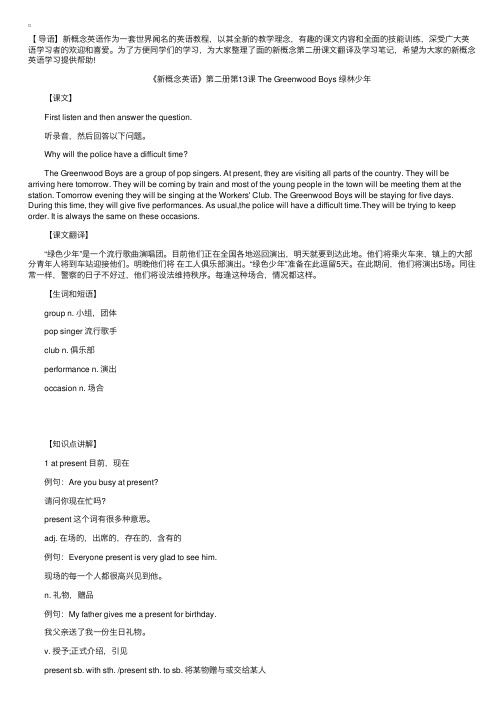
【导语】新概念英语作为⼀套世界闻名的英语教程,以其全新的教学理念,有趣的课⽂内容和全⾯的技能训练,深受⼴⼤英语学习者的欢迎和喜爱。
为了⽅便同学们的学习,为⼤家整理了⾯的新概念第⼆册课⽂翻译及学习笔记,希望为⼤家的新概念英语学习提供帮助!《新概念英语》第⼆册第13课 The Greenwood Boys 绿林少年【课⽂】First listen and then answer the question.听录⾳,然后回答以下问题。
Why will the police have a difficult time?The Greenwood Boys are a group of pop singers. At present, they are visiting all parts of the country. They will be arriving here tomorrow. They will be coming by train and most of the young people in the town will be meeting them at the station. Tomorrow evening they will be singing at the Workers' Club. The Greenwood Boys will be staying for five days. During this time, they will give five performances. As usual,the police will have a difficult time.They will be trying to keep order. It is always the same on these occasions.【课⽂翻译】“绿⾊少年”是⼀个流⾏歌曲演唱团。
五年级下册英语第13课
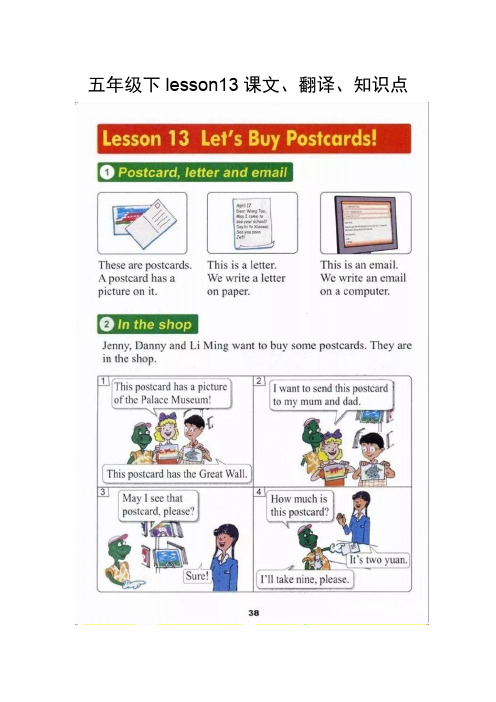
五年级下lesson13课文、翻译、知识点课文翻译第十三课:让我们买明信片1、明信片,信和电子邮件这些是明信片。
一张明信片上有一幅画。
这是信。
我们在纸上写信。
这是电子邮件。
我们在电脑上写电子邮件。
2、在商店里Jenny,Danny和李明想买一些明信片。
他们在商店里。
这张明信片上有一张故宫的图片!这张明信片有长城。
我想把这张明信片寄给我的妈妈和爸爸。
我可以看看那张明信片吗?当然!这张明信片多少钱?两元。
我要买9张。
重点句型I want to send this postcard to my mum and dad.我想把这张明信片寄给我的妈妈和爸爸句型结构:I want to send+某物+to+某人.我想把……寄给……解析:句型"I want to send+某物+to+某人.”want意为“想要”,后面接动词不定式。
send意为“邮寄、发送”例句:I want to send this letter to my friend.我想把这封信寄给我的朋友。
How much is this postcard?这张明信片多少钱?句型结构:How much+is/are+主语?多少钱?解析:句型How much+is/are+主语?",意为“……多少钱”,用于询问某(些)物的价格。
答语通常用句型“主语+is/are+钱数.”或直接回答钱数即可。
注意:how much除了可以询问价格外,还可以用来询问不可数名词的量,意为“多少”。
例句:How much is the book?这本书多少钱?。
高级英语下lesson 13课文翻译
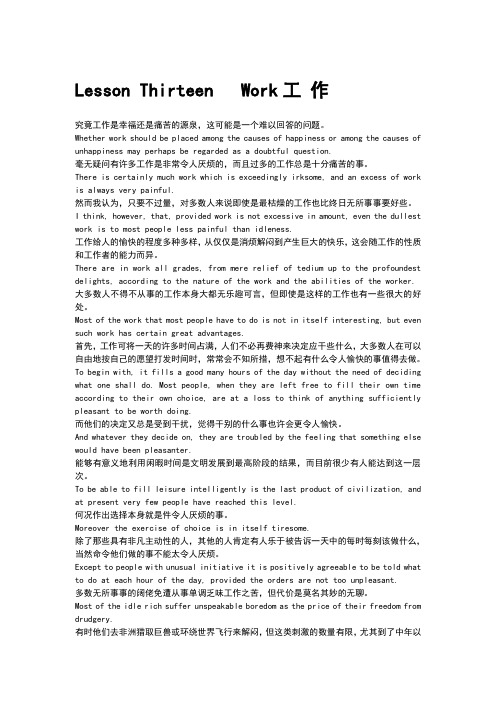
Lesson Thirteen Work工作究竟工作是幸福还是痛苦的源泉,这可能是一个难以回答的问题。
Whether work should be placed among the causes of happiness or among the causes of unhappiness may perhaps be regarded as a doubtful question.毫无疑问有许多工作是非常令人厌烦的,而且过多的工作总是十分痛苦的事。
There is certainly much work which is exceedingly irksome, and an excess of work is always very painful.然而我认为,只要不过量,对多数人来说即使是最枯燥的工作也比终日无所事事要好些。
I think, however, that, provided work is not excessive in amount, even the dullest work is to most people less painful than idleness.工作给人的愉快的程度多种多样,从仅仅是消烦解闷到产生巨大的快乐,这会随工作的性质和工作者的能力而异。
There are in work all grades, from mere relief of tedium up to the profoundest delights, according to the nature of the work and the abilities of the worker. 大多数人不得不从事的工作本身大都无乐趣可言,但即使是这样的工作也有一些很大的好处。
Most of the work that most people have to do is not in itself interesting, but even such work has certain great advantages.首先,工作可将一天的许多时间占满,人们不必再费神来决定应干些什么,大多数人在可以自由地按自己的愿望打发时间时,常常会不知所措,想不起有什么令人愉快的事值得去做。
人教新版英语六年级上册第三单元中文翻译
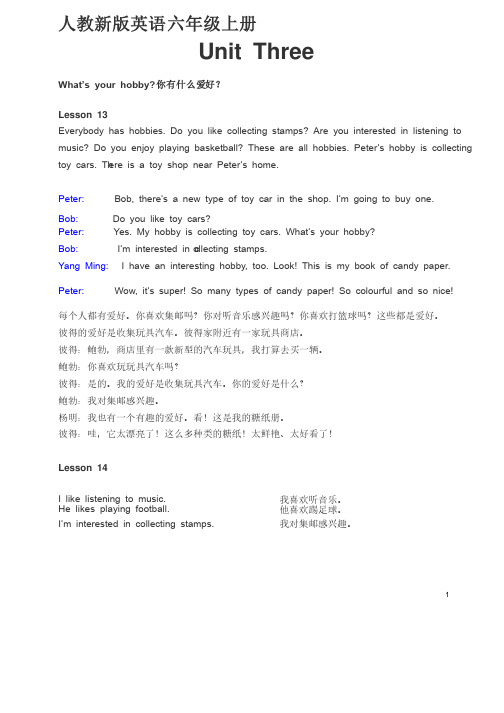
人教新版英语六年级上册Unit ThreeWhat’s your hobby? 你有什么爱好?Lesson 13Everybody has hobbies. Do you like collecting stamps? Are you interested in listening to music? Do you enjoy playing basketball? These are all hobbies. Peter’s hobby is collecting toy cars. Th ere is a toy shop near Peter’s home. Peter: Bob, there’s a new type of toy car in the shop. I’m going to buy one. Bob: Do you like toy cars? Peter: Yes. My hobby is collecting toy cars. What’s your hobby? Bob: I’m interested in c ollecting stamps. Yang Ming: I have an interesting hobby, too. Look! This is my book of candy paper. Peter: Wow, it’s super! So many types of candy paper! So colourful and so nice!每个人都有爱好。
你喜欢集邮吗?你对听音乐感兴趣吗?你喜欢打篮球吗?这些都是爱好。
彼得的爱好是收集玩具汽车。
彼得家附近有一家玩具商店。
彼得:鲍勃,商店里有一款新型的汽车玩具,我打算去买一辆。
鲍勃:你喜欢玩玩具汽车吗?彼得:是的。
我的爱好是收集玩具汽车。
你的爱好是什么?鲍勃:我对集邮感兴趣。
杨明:我也有一个有趣的爱好。
新概念英语第三册课文翻译lesson 13
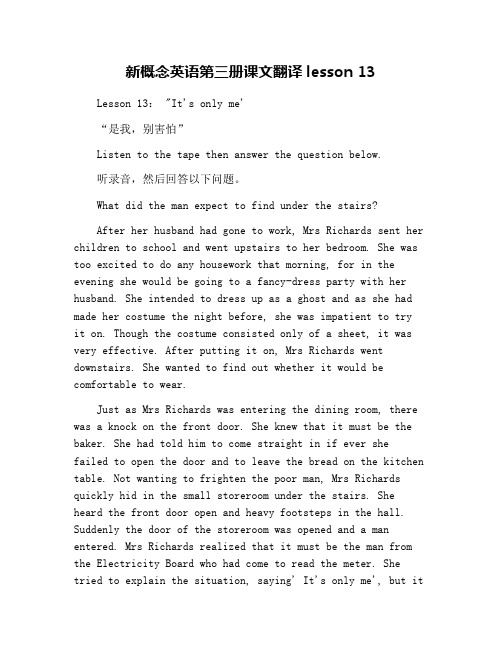
新概念英语第三册课文翻译lesson 13 Lesson 13: "It's only me'“是我,别害怕”Listen to the tape then answer the question below.听录音,然后回答以下问题。
What did the man expect to find under the stairs?After her husband had gone to work, Mrs Richards sent her children to school and went upstairs to her bedroom. She was too excited to do any housework that morning, for in the evening she would be going to a fancy-dress party with her husband. She intended to dress up as a ghost and as she had made her costume the night before, she was impatient to tryit on. Though the costume consisted only of a sheet, it was very effective. After putting it on, Mrs Richards went downstairs. She wanted to find out whether it would be comfortable to wear.Just as Mrs Richards was entering the dining room, there was a knock on the front door. She knew that it must be the baker. She had told him to come straight in if ever shefailed to open the door and to leave the bread on the kitchen table. Not wanting to frighten the poor man, Mrs Richards quickly hid in the small storeroom under the stairs. She heard the front door open and heavy footsteps in the hall. Suddenly the door of the storeroom was opened and a man entered. Mrs Richards realized that it must be the man from the Electricity Board who had come to read the meter. She tried to explain the situation, saying' It's only me', but itwas too late. The man let out a cry and jumped back several paces. When Mrs Richards walked towards him, he fled, slamming the door behind him.New words and expressions 生词与短语costumen. 化装服consistv. 由……组成sheetn. 被单effectiveadj. 有明显效果的,有作用的metern. 电表pacen. 一步flee (fled, fled)v. 逃走slamv. 砰地关上本文参考译文理查兹夫人等丈夫上班走后,把孩子送去上学,然后来到楼上自己的卧室。
高二英语必修5Unit13 People课文翻译

Unit13 PeopleWarm-up 热身Listen to the police description.听警方的描述Which people in the photo below are the police looking for?下面图片中的哪个人是警方要找的对象Police are looking for four people in connection with a crime.警方正在寻找与案件有关的四个嫌疑人They were last seen in the London area.他们最后一次出现是在伦敦The first is a white man.第一个是白人He is quite tall with short, dark hair.他个头很高,留着黑色的短发He was last seen wearing a black baseball cap, a blue long-sleeve shirt and sunglasses.他最后一次出现时戴着一顶黑色的棒球帽、一副太阳镜,穿着一件蓝色的长袖衬衫。
The second is a white man wearing glasses.第二个是戴着眼镜的白人He has little hair and was last seen wearing a white shirt and holding books under his arm.他头发很少,最后一次出现时穿着白色的衬衫,腋下夹着书The third is a black woman.第三个是黑人妇女She has short hair and was last seen wearing a black and white T-shirt with a gold chain around her neck. 她留着短发,最后一次出现时穿着黑白相同的T恤,脖子上戴着金项链。
现代大学英语第十三课讲解带中文翻译
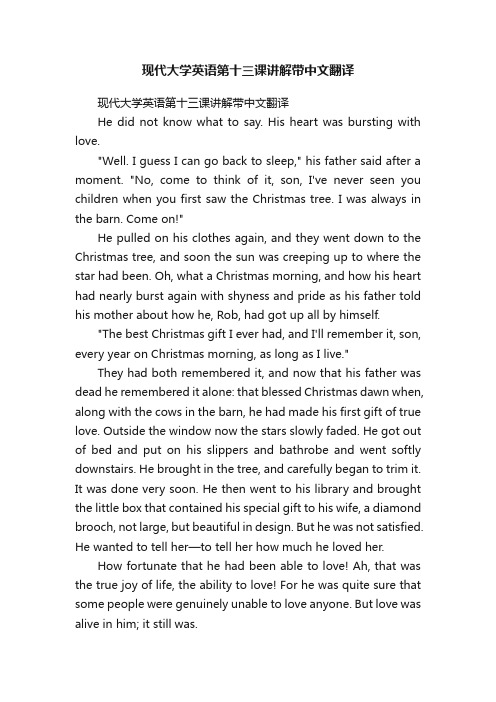
现代大学英语第十三课讲解带中文翻译现代大学英语第十三课讲解带中文翻译He did not know what to say. His heart was bursting with love."Well. I guess I can go back to sleep," his father said after a moment. "No, come to think of it, son, I've never seen you children when you first saw the Christmas tree. I was always in the barn. Come on!"He pulled on his clothes again, and they went down to the Christmas tree, and soon the sun was creeping up to where the star had been. Oh, what a Christmas morning, and how his heart had nearly burst again with shyness and pride as his father told his mother about how he, Rob, had got up all by himself."The best Christmas gift I ever had, and I'll remember it, son, every year on Christmas morning, as long as I live."They had both remembered it, and now that his father was dead he remembered it alone: that blessed Christmas dawn when, along with the cows in the barn, he had made his first gift of true love. Outside the window now the stars slowly faded. He got out of bed and put on his slippers and bathrobe and went softly downstairs. He brought in the tree, and carefully began to trim it. It was done very soon. He then went to his library and brought the little box that contained his special gift to his wife, a diamond brooch, not large, but beautiful in design. But he was not satisfied. He wanted to tell her—to tell her how much he loved her.How fortunate that he had been able to love! Ah, that was the true joy of life, the ability to love! For he was quite sure that some people were genuinely unable to love anyone. But love was alive in him; it still was.It occurred to him suddenly that it was alive because long ago it had been born in him when he knew his father loved him. That was it: love alone could waken love. And this morning, this blessed Christmas morning, he would give it to his beloved wife. He could write it down in a letter for her to read and keep forever. He went to his desk and began: My dearest love.When it was finished, he sealed it and tied it on the tree. He put out the light and went tiptoing up the stairs. The stars in the sky were gone, and the first rays of the sun were gleaming in the east, such a happy, happy Christmas!他不知道说好,心里满是意。
外研社《英语初级听力》第13课课文翻译

Lesson 13Section One:A. Dialogues:Dialogue 1:— Can I help you, sir?— We want a meal.— What sort of meal? A hot one or a cold one?— A salad, I think.— Which one, sir? A ham or a beef salad? —What’s this sort of salad in English?— Which one are you looking at, sir?— That one over there, next to the bread rolls. —That’s a beef salad, sir.— Thank you. Is there any rye bread?— No, I’m sorry. There are plenty of rolls.—先生,我有什么能帮你的吗?—我们想吃点饭。
—什么饭?你们想要冷餐还是热餐?—我觉得沙拉就行。
—那是什么样的沙拉?火腿的还是牛肉的?—这种沙拉用英语这么说?—嗯?先生你看的是哪一个?—在那边的那一个,就在面包圈的旁边。
—哦,先生,那是牛肉沙拉。
—谢谢。
这有黑麦面包吗?—对不起,没有黑麦的。
但有许多面包圈。
Dialogue 2:— Excuse me, sir, where do you come from?— We come from Copenhagen.— You speak English very well.— Thank you.— What are you doing at the moment?—We’re visiting London.— What do you both do?— We are teachers.—先生,对不起打扰你了。
你们是哪里人?—我们来自哥本哈根。
高级英语第十三课翻译

半难得停靠英国港口。我们的商船是远洋国际商船,也就是说,它们往来于外国与外国之间运输货物。例如,在日本至澳大利亚航线上,在日益发展的远东与中东之间的贸易航线上,以及在波斯湾周围的贸易航线上,英国海运公司都包揽着大量的生意。直到最近,这些航线对英国海运公司来说还是非常有利可图的,也是英国赚取外汇的主要来源。然而,它们也正是第三世界国家和苏联千方百计极力想争夺的航线。
例如,集装箱本是美国人的发明,但却是英国船主们投资首创了国际远洋集装箱海运业务。集装箱运输节省时间,因为装货作业在工厂或仓库里即可完成而不必在码头上完成。集装箱运输也非常安全可靠,有利于防盗;除箱体外面的编号外,集装箱上没有任何表明箱内所装是何货物的标记。要有效地利用集装箱这一技术革命的成果,必须拥有可与之配套的先进的公路和铁路运输系统,而这是大多数第三世界国家所不具备的条件。此外,集装箱货船造价高昂,每艘船大约为5 000万英镑。
有关海运方面的规定并不在意,因为这个规定可能还会有助于提高他们在海运生意中的分成比例。德国和比利时的情形也和法国一样。所以,英国不能指望欧共体在这个问题上采取一致的行动。在对待俄国方面,英国一直同西德和丹麦一道呼吁采取协调行动,监测俄国商船的动向,并限制停靠欧共体国家港口的俄国船只的数量。但在6月份,法国人却因其与俄国的特殊关系而阻碍这一计划的通过。而要到11月份,这一计划才能得到重新审议。
英国海运公司最终将有可能被完全挤出海运行业。有些海运公司,如东方远洋船运公司,业已转向从房屋建筑到石油开采等其他领域发展业务。而那些规模较小的海运公司却没有足够的财力来从事多样化经营,它们面临着破产的命运。一旦这些海运公司破产,英国有限的几个值得保留的传统产业的一大部分也会随之消亡。
多数第三世界的新兴国家都在努力提高用本国商船运载货物的比例。发展中国家将商船队看成国家地位的象征——是仅次于国家航空事业的优先发展目标。在最近15年中,新加坡将自己的商船队扩大了60倍,印度也扩大了4倍。
新概念英语第一册课文翻译及学习笔记Lesson133~138

【导语】为了⽅便同学们的学习,为您精⼼整理了“新概念英语第⼀册课⽂翻译及学习笔记Lesson133~138”,希望有了这些内容的帮助,可以为⼤家学习新概念英语提供帮助!如果您想要了解更多新概念英语的相关内容,就请关注吧!新概念英语第⼀册课⽂翻译及学习笔记Lesson133~134 【课⽂】 Reporter: Have you just made a new film, Miss Marsh? Miss Marsh: Yes, I have. Reporter: Are you going to make another? Miss Marsh: No, I'm not. I'm going to retire. I feel very tired. I don't want to make another film for a long time. Kate: let's buy a newspaper, Liz. Listen to this! "Karen Marsh: Sensational News! By our reporter, Alan Jones. Karen Marsh arrived at London Airport today. She was wearing a blue dress and a mink coat. She told me she had just made a new film. She said she was not going to make another. She said she was going to retire. She told reporters she felt very tired and didn't want to make another film for a long time." Liz: I wonder why! 【课⽂翻译】 记者:您刚拍完⼀部新电影吗,马什⼩姐? 马什⼩姐:是的,我刚拍完。
新概念第四册课文翻译及学习笔记Lesson13

新概念第四册课文翻译及学习笔记Lesson13【课文】First listen and then answer the following question.听录音,然后回答以下问题。
What do oilmen want to achieve as soon as they strike oil?The deepest holes of all are made for oil, and they go down to as much as 25,0000 feet. But we do not need to send men down to get the oil out, as we must with other mineral deposits. The holes are only borings, less than a foot in diameter. My particular experience is largely in oil, and the search for oil has done more to improve deep drilling thanany other mining activity. When it has been decided where we are going to drill, we put up at the surface an oil derrick.It has to be tall because it is like a giant block and tackle, and we have to lower into the ground and haul out of the ground great lengths of drill pipe which are rotated by an engine at the top and are fitted with a cutting bit at the bottom.The geologist needs to know what rocks the drill has reached, so every so often a sample is obtained with a coring bit. It cuts a clean cylinder of rock, from which can be seen the strata the drill has been cutting through. Once we get down to the oil, it usually flows to the surface becausegreat pressure, either from gas or water, is pushing it. This pressure must be under control, and we control it by means of the mud which we circulate down the drill pipe. We endeavourto avoid the old, romantic idea of a gusher, which wastes oiland gas. We want it to stay down the hole until we can lead it off in a controlled manner.T.F.GASKELL The Search for the Earth's Minerals from Discovery【New words and expressions 生词和短语】mineral adj. 矿物的boring n. 钻孔derrick n. 井架block and tackle 滑轮组haul v. 拖,拉rotate v. 使转动cutting bit 钻头geologist n. 地质学家coring bit 取芯钻头cylinder n. 圆柱体strata n. 岩层[复]([单]stratum或strata [误用])circulate v. 注入,环流gusher n. 喷油井【课文注释】1.they go down to as much as 25,0000 feet,as much as意为“多达”,“达到(量)”。
高级英语第二册第十三课课文翻译 高级英语2 第13课 Unit 13 Lesson 13

第十三课为死刑辩护《中世纪》杂志上刊载了我随便讲的一番话后,许多反对死刑的信件和小册子向我飞来。
这些信件,有的是对我的观点表示遗憾,有的是对我的观点给予斥责。
他们要我承认自己不是愚昧无知就是麻木不仁,责问我是否知道面临着一场世界性的废除死刑的运动,而且这场运动已经得到了包括法学家在内的各界有识之士的广泛支持;他们说将人处死既无人道又违背科学。
因为无论是强奸犯还是杀人犯,其实都是病人,对他们应当给予医治而不应该处死。
他们要我认真地思考并认识到将人处死的任何形式所引起的恐惧都是不堪容忍的。
的确,这场废除死刑的运动已遍及世界,而且已宣传得深入人心,尤其在英国更是如此。
这场运动的领导者就是我的老友兼出版商维克托?高兰兹先生,还有阿瑟?凯斯特勒、CH罗尔夫、詹姆斯?艾弗里?乔伊斯、约翰?巴里爵士等一批享有盛名的作家。
国内外精神病学界的人士都倾向于采取治病救人的方针,而且许多自由派报纸,譬如《观察家报》就极力地主张彻底废除死刑。
在美国,至少有25个州级协会、一家全国性协会以及一系列教派在为此目的而努力,其中最引人注意的是教友派和主教派。
如此之多的英才贤士群起支持一项善意的提议,当然会使任何敌对的一方望而却步。
为了阐明我的观点(尽管我的观点目前几乎不得人心),我得申明我的结论是可以争辩的,也就是说,我仍愿意服从真理,但条件是首先必须澄清废除派论点中的某些谬误和强词夺理之言;这些问题必须解决,而不能置之不理。
若能做到这些,我当然非常高兴。
这不仅是因为看到无懈可击的事实乃一件乐事,而且是因为我并不比别人更好杀戳;我很希望能看到有既能维护社会又能保护罪犯(而不是将罪犯处死)的好办法,但我要重申,这些办法必须能切实解决我将要谈到的一些问题,而不能对此回避或拖延。
在开始之前我还要补充说明一句:我或许再不会答复有关这个使人们反应强烈的问题的任何来信。
如果这篇公开发表的文章还不能证明我的论点的话,那么,匆匆往复的私人信函也不可能起什么作用。
Unit-13-Our-Schedules--Our-Selves课文翻译综合教程三

Unit 13Our Schedules, Our SelvesJay Walljasper1 DAMN! You’re 20 minutes —no, more like half an hour —late for your breakfast meeting, which you were hoping to scoot out of early to make an 8:30 seminar across town. And, somewhere in there, there’s that conference call. Now, at the last minute, you have to be at a 9:40 meeting. No way you can miss it. Let’s see, the afternoon is totally booked, but you can probably push back your 10:15 appointment and work through lunch. That would do it. Whew! The day has barely begun and already you are counting the hours until evening, when you can finally go home and happily, gloriously, triumphantly, do nothing. You’ll skip yoga class, blow off the neighborhood meeting, ignore the piles of laundry and just relax. Yes! … No! Tonight’s the night of the concert. You promised Nathan and Mara weeks ago that you would go. DAMN!2 Welcome to daily grind circa 2003 — a grueling 24-7 competition against the clock that leaves even the winners wondering what happened to their lives. Determined and sternly focused, we march through each day obeying the orders of our calendars. The idle moment, the reflective pause, serendipity of any sort have no place in our plans. Stopping to talk to someone or slowing down to appreciate a sunny afternoon will only make you late for your next round of activities. From the minute we rise in the morning, most of us have our day charted out. The only surprise is if we actually get everything done that we had planned before collapsing into bed at night.3 On the job, in school, at home, increasing numbers of North Americans are virtual slaves to their schedules. Some of what fills our days are onerous obligations, some are wonderful opportunities, and most fall in between, but taken together they add up to too much. Too much to do, too many places to be, too many things happening too fast, all mapped out for us in precise quarter-hour allotments on our palm pilots or day planners. We are not leading our lives, but merely following a dizzying timetable of duties, commitments, demands, and options. How did this happen? Where’s the luxurious leisure that decades of technological progress was supposed to bestow upon us?4 The acceleration of the globalized economy, and the accompanying decline of people having any kind of a say over wages and working conditions, is a chief culprit. Folks at the bottom of the socio-economic ladder feel the pain most sharply. Holdingdown two or three jobs, struggling to pay the bills, working weekends, no vacation time, little social safety net, they often feel out of control about everything happening to them. But even successful professionals, people who seem fully in charge of their destinies, feel the pinch. Doctors, for example, working impossibly crowded schedules under the command of HMOs, feel overwhelmed. Many of them are now seeking union representation, traditionally the recourse of low-pay workers.5 The onslaught of new technology, which promised to set us free, has instead ratcheted up the rhythms of everyday life. Cell phones, , and laptop computers instill expectations of instantaneous action. While such direct communication can loosen our schedules in certain instances (it’s easier to shift around an engagement on short notice), overall they fuel the trend that every minute must be accounted for. It’s almost impossible to put duties behind you now, when the boss or committee chair can call you at a rap show or sushi restaurant, and documents can be ed to you on vacation in Banff or Thailand. If you are never out of the loop, then are you ever not working?6 Our own human desire for more choices and new experiences also plays a role. Just like hungry diners gathering around a bountiful smorgasbord, it’s hard not to pile too many activities on our plates. An expanding choice of cultural offerings over recent decades and the liberating sense that each of us can fully play a number of different social roles (worker, citizen, lover, parent, artist, etc.) has opened up enriching and exciting opportunities. Spanish lessons? Yes. Join a volleyball team? Why not. Cello and gymnastics classes for the kids? Absolutely. Tickets to a blues festival, food and wine expo, and political fundraiser? Sure. And we can’t forget to make time for school events, therapy sessions, protest rallies, religious services, and dinner with friends.7 Yes, these can all add to our lives. But with only 24 hours allotted to us each day, something is lost too. You don’t just run into a friend anymore and decide to get coffe e. You can’t happily savor an experience because your mind races toward the next one on the calendar. In a busy life, nothing happens if you don’t plan it, often weeks in advance. Our “free” hours become just as programmed as the work day. What begins as an idea for fun frequently turns into an obligation obstacle course. Visit that new barbecue restaurant. Done! Go to tango lessons. Done! Fly to Montreal for a long weekend. Done!8 We’ve booked ourselves so full of prescheduled activities there’s no ti me left for those magic, spontaneous moments that make us feel most alive. We seldomstop to think of all the experiences we are eliminating from our lives when we load up our appointment book. Reserving tickets for a basketball game months away could mean you miss out on the first balmy evening of spring. Five p.m. skating lessons for your children fit so conveniently into your schedule that you never realize it’s the time all the other kids in the neighborhood gather on the sidewalk to play.9 A few years back, radical Brazilian educator Paulo Freire was attending a conference of Midwestern political activists and heard over and over about how overwhelmed people felt about the duties they face each day. Finally, he stood up and, in slow, heavily accent ed English, declared, “We are bigger than our schedules.” The audience roared with applause.10 Yes, we are bigger than our schedules. So how do we make sure our lives are not overpowered by an endless roster of responsibilities? Especially in an age where demanding jobs, two-worker households or single-parent families make the joyous details of everyday life -- cooking supper from scratch or organizing a block party —seem like an impossible dream? There is no set of easy answers, despite what the marke ters of new convenience products would have us believe. But that doesn’t mean we can’t make real steps to take back our lives.11 Part of the answer is political. So long as Americans work longer hours than any other people on Earth we are going to feel hemmed in by our schedules. Expanded vacation time for everyone, including part-time and minimum wage workers, is one obvious and overdue solution. Shortening the work week, something the labor movement and progressive politicians successfully accomplished in the early decades of the 20th century, is another logical objective. There’s nothing preordained about 40-hours on the job; Italy, France, and other European nations have already cut back working hours. An opportunity for employees outside academia to take a sabbatical every decade or so is another idea whose time has come. And how about more vacation and paid holidays? Let’s start with Martin Luther King’s birthday, Susan B. Anthony’s birthday, and your own! Any effort to give people more clout in the ir workplaces —from strengthened unions to employee ownership —could help us gain much-needed flexibility in our jobs, and our lives.12 On another front, how you think about time can make a big difference in how you feel about your life, as other articles in this cover section illustrate. Note how some of your most memorable moments occurred when something in your schedule fell through. The canceled lunch that allows you to spend an hour strolling around town. Friday night plans scrapped for a bowl of popcorn in front of the fireplace.Don’t be shy about shucking your schedule whenever you can get away with it. And with some experimentation, you may find that you can get away with it a lot more than you imagined.13 Setting aside some time on your calendar for life to just unfold in its own surprising way can also nurture your soul. Carve out some nonscheduled hours (or days) once in a while and treat them as a firm commitment. And resist the temptation to turn every impulse or opportunity into anoth er appointment. It’s neither impolite nor inefficient to simply say, “let me get back to you on that tomorrow” or “let’s check in that morning to see if it’s still a good time.” You cannot know how crammed that day may turn out to be, or how uninspired you might feel about another engagement, or how much you’ll want to be rollerblading or playing chess or doing something else at that precise time.14 In our industrialized, fast-paced society, we too often view time as just another mechanical instrument to be programmed. But time possesses its own evershifting shape and rhythms, and defies our best efforts to corral it within the tidy lines of our palm pilots or datebooks. Stephan Rechtschaffen, author of Time Shifting, suggests you think back on a scary auto collision (or near miss), or spectacular night of lovemaking. Time seemed almost to stand still. You can remember everything in vivid detail. Compare that to an overcrammed week that you recall now only as a rapid-fire blur. Keeping in mind that our days expand and contract according to their own patterns is perhaps the best way to help keep time on your side.日程,自我杰伊·沃尔贾斯珀1. 讨厌!迟到了20分钟——不对,差不多半小时了——本来还想着这早餐会议可以早早完毕,然后去赶8:30在城市另一端召开的交流会。
- 1、下载文档前请自行甄别文档内容的完整性,平台不提供额外的编辑、内容补充、找答案等附加服务。
- 2、"仅部分预览"的文档,不可在线预览部分如存在完整性等问题,可反馈申请退款(可完整预览的文档不适用该条件!)。
- 3、如文档侵犯您的权益,请联系客服反馈,我们会尽快为您处理(人工客服工作时间:9:00-18:30)。
事情可不能由这儿说起,得打头来。
open the ball:作为开头 ball:作为开头 But this isn’t the way to open the ball . isn’ We should go the whole animal.
先交代我自己吧。 先交代我自己吧。我 what not:诸如此类 not: 是个算命的先生, 是个算命的先生,我 的东西 也卖过酸枣、 也卖过酸枣、落花生 gal:( :(口 什么的。 什么的。那可是先前 old gal:(口)老伴 的事了。 的事了。现在我在街 kicked up one’s one’ 上摆卦摊儿;好了呢, 上摆卦摊儿;好了呢, heels :(俚) 死 一天也抓弄三毛五毛 人力车, 老伴儿早死啦, 的。老伴儿早死啦, rickshaw :人力车, 儿子拉洋车。 儿子拉洋车。我们爷 黄包车 儿俩住着柳家大院的 一间北房。 一间北房。
cry cupboard 〔口语〕 口语〕 喊饿,想吃东西。 喊饿,想吃东西。
译文赏析
首先,译文在措辞上的特征主要表现在以 下几个方面: 第一, 俚俗语的大量运用 译文中随处可见的俚语、诅咒语、口头语 的运用,无疑是其最显著的风格特点:
第二, 译文中除少数多音节词之外,大都 是单音节或双音节的词,基本上找不到抽 象名词。 第三, 省略词比较多,如:isn’t, 省略词比较多,如:isn’ That’ ,haven’ one’ won’ That’s ,haven’t, one’s, won’t, there’ there’s .
再从语法和句式运用的角度分析, 再从语法和句式运用的角度分析,老舍句式灵活 多样,多用短句,字数不拘,少到三个、四个、 多样,多用短句,字数不拘,少到三个、四个、 五个、六个不等,最多也不超过十六个字, 五个、六个不等,最多也不超过十六个字,如: 三个:好了呢;不说呢; 三个:好了呢;不说呢; 四个:出了人命;得打头来;也没什么; 四个:出了人命;得打头来;也没什么;大家见 透着和气;谁说得清; 面;透着和气;谁说得清; 五个:儿子拉洋车; 五个:儿子拉洋车; 六个:明儿个又搬走;可得吃饱啦; 六个:明儿个又搬走;可得吃饱啦;王家住着两 间房; 间房; 十六个:我们爷儿俩住着柳家大院的一间北房; 十六个:我们爷儿俩住着柳家大院的一间北房; 由于短句具有简洁、明快、活泼、轻松的特点, 由于短句具有简洁、明快、活泼、轻松的特点, 语句组织疏松而清爽,语气和缓而随意, 语句组织疏松而清爽,语气和缓而随意,能给人 以如话家常般的轻松感和亲切感,所以读起来使 以如话家常般的轻松感和亲切感, 人如闻其声,似乎作品主人公正娓娓道来。 人如闻其声,似乎作品主人公正娓娓道来。
大家见面,招呼声“吃了吗? 大家见面,招呼声“吃了吗?”透着 和气,不说呢,也没什么。 和气,不说呢,也没什么。
When people meet , they greet each other with a “How do you do ?”, ?” just to show their good neighbourly feelings. But if they should cut each other dead , nobody would care.
大家一天到晚为嘴奔命, 大家一天到晚为嘴奔命, 没有工夫扯闲盘儿。 没有工夫扯闲盘儿。爱说 话的自然也有。 话的自然也有。可得先吃 饱啦。 饱啦。 When one’s knocked one’ about from pillar to post for his bread day in and day out , he won’ won’t find ginger enough for gas and gaiters. Of course , there’ there’s those who are all jaw like a sheep’ sheep’s head among us. But one can hardly be in a mood for ragragchewing when one’s one’ guts cry cupboard .
cut sb. dead:不理睬某人 dead: knock about :(口)漂泊, :(口 漂泊, 游荡 from pillar to post :四处奔 走着,到处碰壁地, 走着,到处碰壁地, for his bread (俚) =for his (俚 money day in and day out :日复一 日,每天不间断地 ginger :(口)活力,劲头 :(口 活力, gas :(俚)令人非常满意 :(俚 或愉快的)的事(或人) (或愉快的)的事(或人) be all jaw (like a sheep’s sheep’ head) : 全是空话,废话连篇 全是空话, guts:( 用作单) guts:( 用作单)贪食者
这两天我们大院里又透着热闹,出 这两天我们大院里又透着热闹, 了人命。 了人命。
kick-up:有了问题,出了毛病 kick-up:有了问题,出了毛病 A pretty kick-up has been the order of the kickday again in our compound lately , for a life has been lost.
译文言语风格分析
翻译的风格化是由原著的风格决定的,作者运笔典雅,译 者就要坚决杜绝粗俗,反之亦然。正如王佐良先生说: “一切照原作,雅俗如之,深浅如之,口气如之。” 一切照原作,雅俗如之,深浅如之,口气如之。” 评述译文的风格,主要就是看它是否最大限度地再现了原 文的风格。老舍的语言是自然流畅,通俗易懂的,毫无晦 涩之感,译文也应运用相应的风格传达这种感觉。另外, 由于英汉语言体系的不同,各种体系的语言在表达习惯、 语法结构方面又是独具特色的,因此,在翻译中不可以照 搬原文句式,过分受原文结构的束缚,完全对号入座,否 则译文就很容易充满“翻译腔” 则译文就很容易充满“翻译腔”,句子不仅笨拙臃肿,更 重要的是会无形中还有二十多间房 除了我这间北房, 一共住着多少家子,谁说得清? 呢。一共住着多少家子,谁说得清?
Besides the room we occupy there are twenty more rooms in the same compound. How many families live there , only God knows.
Translation of Prose
汉语散文的特点 选材广泛,结构自由灵活, 艺术表现形式多样;篇幅一般不长。
散文贵在“ 散文贵在“散”, 不拘一格, 用继续、说明、抒情、议论、描写 等多种表达方式;但中心明确,言 简意赅,形散而神不散。
这两天我们大院里又透着热闹,出了人命。 这两天我们大院里又透着热闹,出了人命。 事情可不能由这儿说起,得打头来。 事情可不能由这儿说起,得打头来。 先交代我自己吧。我是个算命的先生, 先交代我自己吧。我是个算命的先生,我也卖过 酸枣、落花生什么的。那可是先前的事了。 酸枣、落花生什么的。那可是先前的事了。现在 我在街上摆卦摊儿;好了呢, 我在街上摆卦摊儿;好了呢,一天也抓弄三毛五 毛的。老伴儿早死啦,儿子拉洋车。 毛的。老伴儿早死啦,儿子拉洋车。我们爷儿俩 住着柳家大院的一间北房。 住着柳家大院的一间北房。 除了我这间北房,大院里还有二十多间房呢。 除了我这间北房,大院里还有二十多间房呢。一 共住着多少家子,谁说得清?住两间房的就不多, 共住着多少家子,谁说得清?住两间房的就不多, 又搭上今儿个搬来,明儿个又搬来, 又搭上今儿个搬来,明儿个又搬来,我没那么好 的记性。大家见面,招呼声“吃了吗? 的记性。大家见面,招呼声“吃了吗?”透着和 不说呢,也没什么。大家一天到晚为嘴奔命, 气,不说呢,也没什么。大家一天到晚为嘴奔命, 没有工夫扯闲盘儿。爱说话的自然也有。 没有工夫扯闲盘儿。爱说话的自然也有。可得先 吃饱啦。 -------老舍 -------老舍 吃饱啦。
柳家大院(节选)
老舍先生是善于运用群众语言的大师。他的作品 行文自由流畅,语言平实自然不雕琢,口语色彩 浓,大量运用北方方言(包括儿化韵)、土语, 乃至一些社会方言,如: 透着(透着热闹、透着和气)、 (事情可不能由这儿说起,)得打头来、 抓弄(三毛五分的)、 搭上今儿个(搬来,)明儿个(又搬走)、 (大家一天到晚)为嘴奔命、 (没有)工夫闲扯盘儿。 除此之外,该节选中对语气词“ 除此之外,该节选中对语气词“吧”、“呢”、 “啦”、“了”的运用,是作者为模仿实际发音 而选择的词,也是口语化的有力证明。
First , a few words about myself. I’m a fortuneI’ fortune先交代我自己吧。 先交代我自己吧。 我是个算命的先 teller. Once I was a 生,我也卖过酸 vender of sour dates , ground枣、落花生什么 ground-nuts and what not. But that was ages 的。那可是先前 ago. Now I keep a 的事了。现在我 fortune-teller’s stall on 的事了。 fortune-teller’ 在街上摆卦摊儿; side在街上摆卦摊儿; side-walk and can the 好了呢, 好了呢,一天也 scrape up three or five dimes a day at best. My 抓弄三毛五毛的。 抓弄三毛五毛的。 老伴儿早死啦, 老伴儿早死啦, old gal had long kicked up her heels. My son’ son’ 儿子拉洋车。 儿子拉洋车。我 rickshaw-boy. That’s s a rickshawThat’ 们爷儿俩住着柳 what he’s. We two , he’ 家大院的一间北 father and son , hang our 房。 hats at a south-facing southroom in the Liu’s Liu’ compound.
